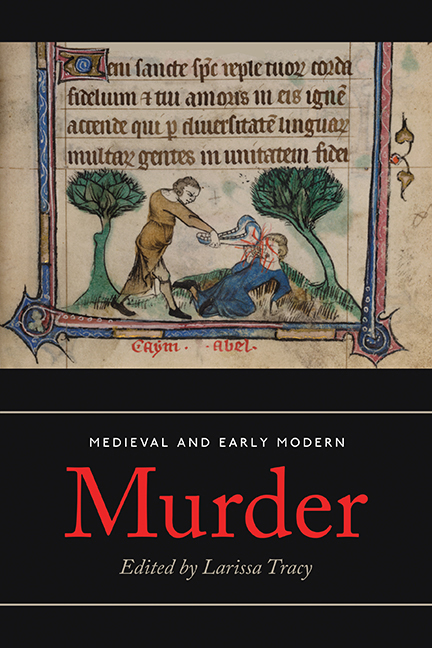Book contents
- Frontmatter
- Contents
- List of Illustrations and Tables
- Acknowledgements
- Contributors
- List of Abbreviations
- Introduction: Murder Most Foul
- I Murder on Trial: Justice, Law and Society
- II The Public Hermeneutics of Murder: Interpretation and Context
- III Murder in the Community: Gender, Youth And Family
- 13 Negotiating Murder in the Historiae of Gregory of Tours
- 14 Poisoning, Killing and Murder in the Edictus Rothari
- 15 Murder, Foul and Fair, in Shota Rustaveli's The Man in the Panther Skin
- 16 A Multiple Poisoning in the City of Valencia: Sanxo Calbó's Crime (1442)
- 17 A Case of Mariticide in Late Medieval France
- 18 Monstrous Un-Making: Maternal Infanticide and Female Agency in Early Modern England
- 19 Imps of Hell: Young People, Murder and the Early English Press
- Conclusion
- Select Bibliography
- Index
16 - A Multiple Poisoning in the City of Valencia: Sanxo Calbó's Crime (1442)
from III - Murder in the Community: Gender, Youth And Family
Published online by Cambridge University Press: 05 July 2018
- Frontmatter
- Contents
- List of Illustrations and Tables
- Acknowledgements
- Contributors
- List of Abbreviations
- Introduction: Murder Most Foul
- I Murder on Trial: Justice, Law and Society
- II The Public Hermeneutics of Murder: Interpretation and Context
- III Murder in the Community: Gender, Youth And Family
- 13 Negotiating Murder in the Historiae of Gregory of Tours
- 14 Poisoning, Killing and Murder in the Edictus Rothari
- 15 Murder, Foul and Fair, in Shota Rustaveli's The Man in the Panther Skin
- 16 A Multiple Poisoning in the City of Valencia: Sanxo Calbó's Crime (1442)
- 17 A Case of Mariticide in Late Medieval France
- 18 Monstrous Un-Making: Maternal Infanticide and Female Agency in Early Modern England
- 19 Imps of Hell: Young People, Murder and the Early English Press
- Conclusion
- Select Bibliography
- Index
Summary
SOME CRIMES, PARTICULARLY MURDER, leave their mark on a community. Their cruelty and their impact on society are so shocking that they appear in the chronicles and are sometimes spoken about from generation to generation. On 19 February 1442, in the presence of Joan Sifre, the knight who acted as the justícia criminal [judge] in the city of Valencia, Pere Roquer (profession unknown) accused his father-in-law Sanxo Calbó (a former craftsman working in textiles as a shearer and apuntador) of having poisoned several members of his family. This poisoning killed Isabel (Calbó's daughter and Roquer's wife) and his grandmother (also called Isabel), but left behind the accuser and Roquer's mother, Estévena (who was also poisoned), with serious after-effects, along with a little baby (Calbó's grandson and the son of Roquer and Isabel who was indirectly poisoned thorough breastfeeding from Isabel) and, finally, a housemaid called Joana.
In one of the quires in a volume of the city of Valencia's justícia criminal the whole trial is preserved in all its procedural form, from the accusation, the taking of statements by witnesses for the prosecution, the defence and the final sentence. This is unusual; normally, trials were put down in writing in fragments distributed in different quires and even in different volumes. This fragmented process of recording events makes consulting the sources difficult, and, occasionally, it means that only part of the process survives. The case presented here is, therefore, quite exceptional because the whole judicial process is preserved from the complaint to the execution of the judgment in the same quire.
Immediately after the accusation, Sanxo Calbó must have been apprehended due to the seriousness of the crimes, although there is no news about it. On 20 February, he was taken from the city jail to answer his son-in-law's accusations. The next morning, the trial lawyers were appointed by both parties and the judge established a period of time for witnesses to be found. Between 22 February and 24 March, a total of forty witnesses paraded through the courthouse, of whom only six were women. This last point is strange, considering that many aspects reported by the witnesses were related to domestic life. In many of the known judicial proceedings referring to crimes committed inside the house, whether civil or criminal, numerous women appear among the witnesses interrogated.
- Type
- Chapter
- Information
- Medieval and Early Modern MurderLegal, Literary and Historical Contexts, pp. 371 - 394Publisher: Boydell & BrewerPrint publication year: 2018



